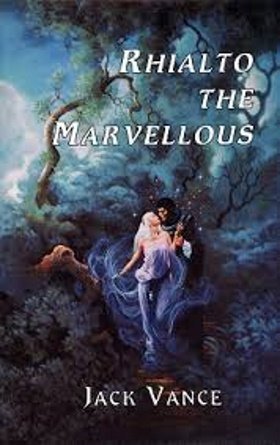“Then why not alter to human form and join us in comfort at the table?”
“That is a good idea.” Sarsem became a naked young epicene in an integument of lavender scales with puffs of purple hair like pom-pons growing down his back. He seated himself at the table but declined refreshment. “This human semblance, though typical, is after all, only a guise. If I were to put such things inside myself, I might well become uneasy.”
“As you like. Now to business. Where is the Blue Perciplex which you were required to guard?”
Sarsem asked cautiously: “You refer to the blue prism reposing on the pedestal? You will find such an object as safe as ever in its accustomed place.”
“And why have you deserted your post?”
“Simplicity itself! One of your ilk delivered a new and official Perciplex to replace the obsolete version, which had lost its effect.”
Rhialto gave a hollow laugh. “And how do you know this for a fact?”
“Through the assertion of your representative.” Sarsem sprawled back in the chair. “As I now reflect on the matter, what with the sun’s death only a jerk and a tinkle away, a new Perciplex seems a pointless refinement.”
“So then: what next?”
“I pointed out the burden of guarding two sacred objects, rather than one. The new, so I was told, would occupy the place of the old, and your representative would take the old to a place of reverent safety. Meanwhile, my services were no longer required.”
Rhialto leaned forward. “No doubt indenture points were discussed?”
“I recall some such discussion.”
“To what number and to what degree?”
“An appreciable proportion: in fact, all.”
“How is this possible when your chug4 resides in my work-room?”
Sarsem scowled. “That is as may be.”
Upon sudden thought Ildefonse lurched to his feet and departed the terrace. A moment later he returned, and threw himself down in his chair. With a bleak expression he said to Rhialto: “Sarsem’s chug is gone. Have you ever heard the like?”
Rhialto reflected. “When might this event have taken place?”
“Evidently during the temporal stasis: when else?” Ildefonse turned upon Sarsem. “We have been victimized together! The reduction of your indenture points was unauthorized! You are the victim of a cruel joke! The reduction is null and void, and we have lost the Perciplex! Sarsem, I cannot commend your performance.”
“Ha ha!” cried Sarsem, waving a pale lavender forefinger upon which glinted a silver fingernail. “There is more to come! I am not quite the fool you take me for!”
“How so, and in what regard?”
“I am that rare individual who can instantly scrutinize all sides of a situation! Without reference to my motives, I decided to retain the old Perciplex within the scope of my vigilance.”
“Ha, ha, hah! Bravo, Sarsem!”
“Thereupon, your representative —”
“Speak less loosely, Sarsem. The person was not my representative.”
“While this person was temporarily distracted, I laid the old prism safely aside. This person, whose good faith you decry, still cannot be deemed irresponsible.”
“Why do you say that?”
“Because, like myself, he worried about the safety of the old Perciplex and would not rest until he learned where I had placed it.”
Rhialto groaned. “Within the confines of a cavern?”
“Yes, how did you know?”
“We are not without resources. In effect you yielded up the Perciplex to the criminal!”
“Not at all. I placed the prism in a place well-known to me, accessible only by a small and narrow fissure. For double security I reverted the object to the Sixteenth Aeon.”
“And how do you know that the criminal himself has not reverted to this era and taken the Perciplex for his own?”
“Can he walk the length of a fissure into which you cannot even thrust your hand? Especially while I keep the opening under survey from then till now, as you might scan the surface of the table? Nothing has come or gone. Ergo, by the rotes of rationality, the Perciplex reposes in its subterranean place, as secure as ever.”
Rhialto rose to his feet. “Come: once more back to Fader’s Waft! You shall grope down the fissure into the Sixteenth Aeon and reclaim the Perciplex. Ildefonse, are you ready? Summon your small air-carriage.”
9
Rhialto, Ildefonse and Sarsem stood disconsolate on the summit of Fader’s Waft. Sarsem spoke in a troubled voice. “A most confusing dilemma! I searched the fissure without success; I guarantee that the Perciplex did not leave by this route. I admit to perplexity.”
Rhialto suggested: “There may be another route into the cavern; what of that?”
“The idea is plausible,” admitted Sarsem. “I will make a survey across the Aeons.”
Sarsem presently returned to make his report. “The cave opened to the valley for a brief period during the Sixteenth Aeon. The entrance is not evident now. This is good news, since if I am a trifle nonplussed, our antagonist must be crazy with bafflement.”

























